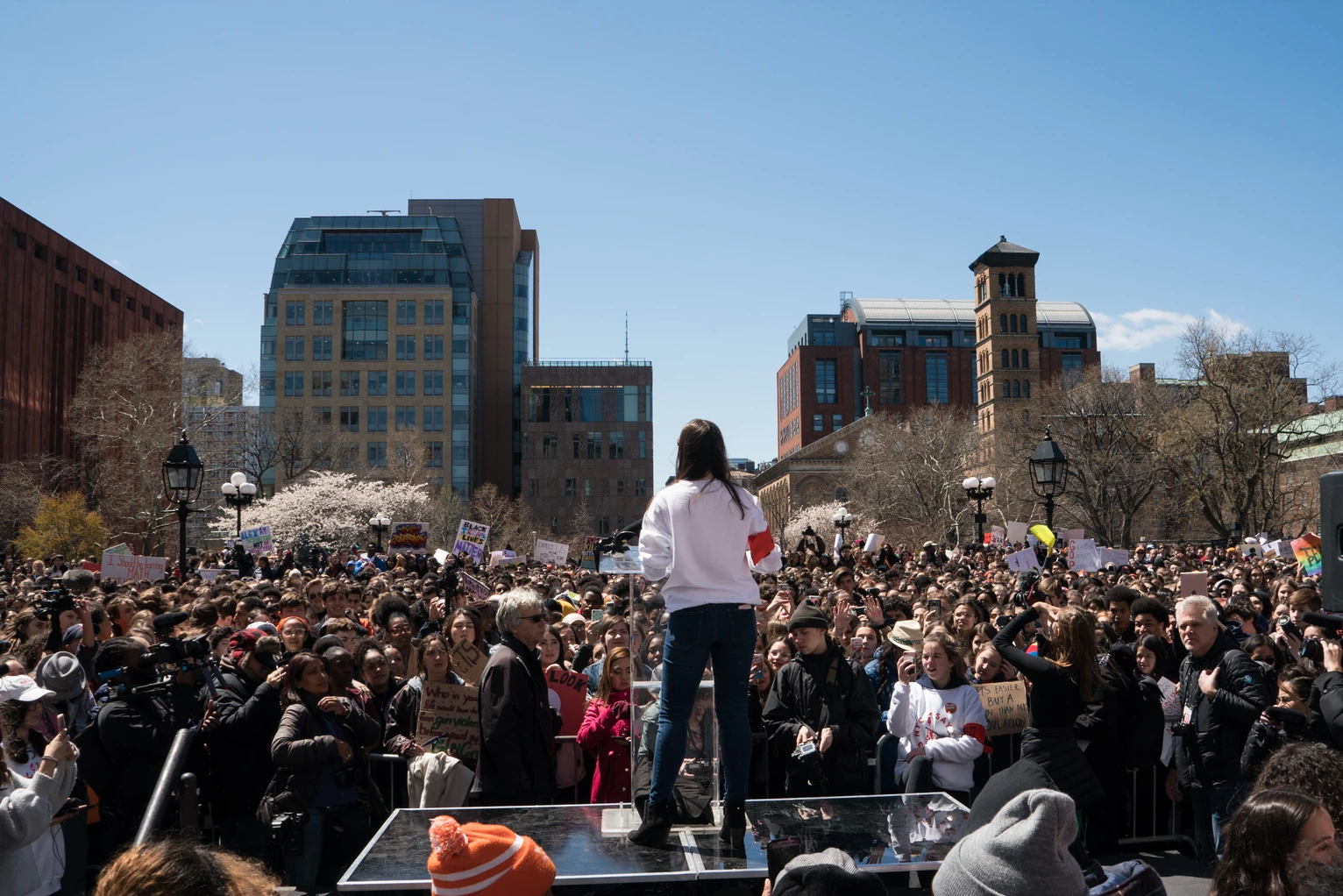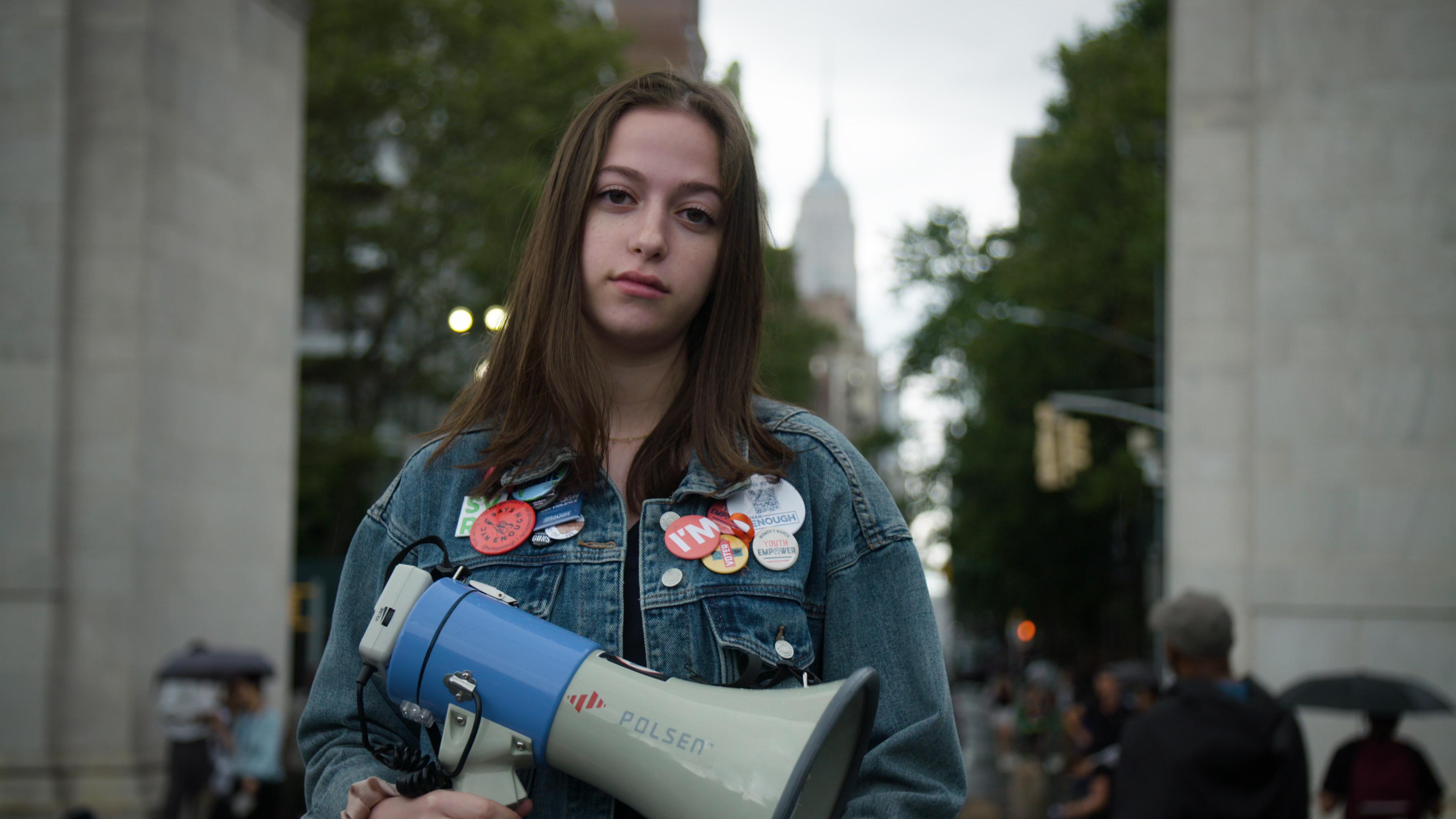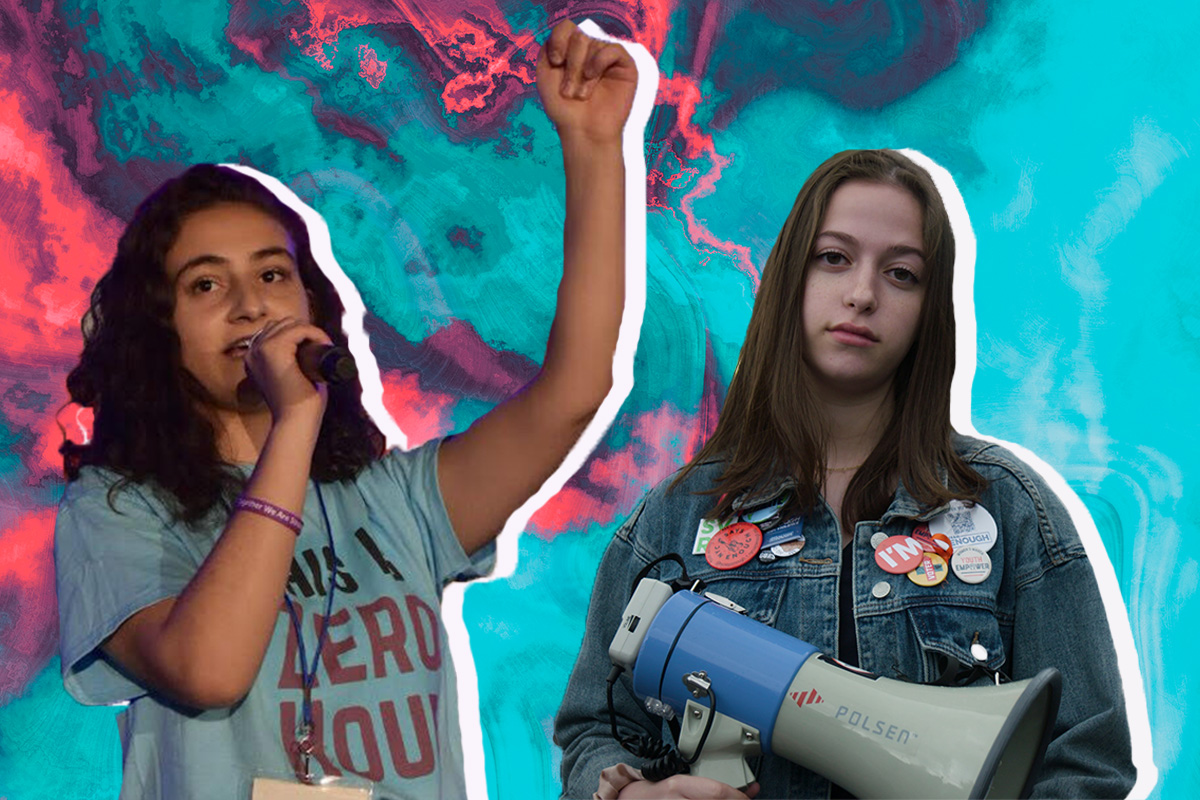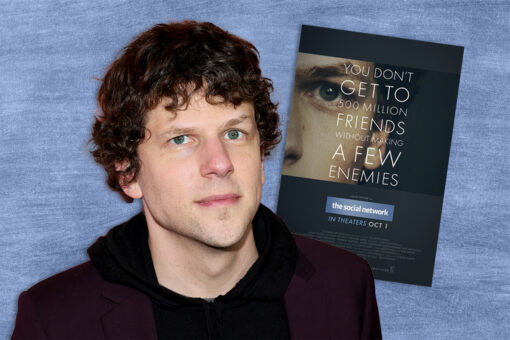Just a few years after their bat mitzvahs, these badass young ladies are taking tikkun olam to a whole new level. Jamie Margolin and Arielle Geismar, 17-year-old Jewish activists from Seattle and New York City respectively, are making a difference in their communities and across the country.
A former rythmic gymnast, Jamie Margolin is the founder of Zero Hour, a coalition of young people confronting climate change through a series of marches, protests, and most recently, a youth summit held in Miami this July. New York City native Arielle Geismar is the NY Director of Team Enough, the youth-led initiative under Brady United Against Gun Violence which educates and mobilizes across parties to end gun violence.
While both teens were obviously too young to vote in the 2016 election, they credit that turning point as an impetus to launch their own activism. I caught up with each teen to find out what inspires them to make a difference, how their Jewish upbringing aligns with their social justice missions, and how they came to be so badass at such a young age.
Why climate change?
I grew up watching tons of documentaries on nature and the environment. Those shows opened my eyes. My grandparents on my dad’s side are your typical hard working people. They came from the depression/WWII era and have lived frugally to save up for their family. Even though my parents couldn’t afford it, my grandparents wanted me to have a private school education. These schools talked about climate change in a way that most public school curriculums avoid.

I also grew up in the Pacific Northwest, with the beauty present around me. I went on a field trip to an area with indigenous people, and I felt this longing for what must have been there before. I didn’t know the complexities of indigenous culture, but I could see what had been there and what wasn’t there anymore. I felt a drive and passion to protect what was left for my future and my life. I was in second grade when I recognized this, but I didn’t know how to take action until I was 14. No one tells kids how to take action.
So, what prompted you to take action at 14?
In short, the 2016 election.
I had a ton of injuries and was falling out of love with rhythmic gymnastics. I didn’t want to half-ass that anymore. I wanted to give 100% to something. At gymnastics, I was the girl to go to for all the younger girls who wanted to know about current events and politics. I was more focused on [that] than actually practicing… My name had gotten on the local DNC’s email list, asking to come phone bank, so I dragged my parents and said, “Hey, I’m here, what can I do?”

I was the only Hispanic person [there], so I served as the unofficial Spanish speaker. A lady from Miami called and said there had been voter intimidation. I was the one who had to deal with it, because I was the only one she was able to talk to. I got the info back to the right people and stopped this whole early voting shenanigan. I really earned the respect of the people in the office and they were like, “Damn.”
I was so excited for the change and progress to come. Then Trump got elected and everything fell apart. I went into a depression for two months.
But then I was like, well, there’s this climate thing I’m passionate about, and I want to take action on that.
Tell me about Zero Hour, how it started, and what the goal is.
There was Hurricane Maria, Harvey, all these horrible climate disasters. Then Trump pulled us out of the Paris accords. Plus, in Seattle and Canada, there were these wildfires caused by a really hot and dry summer. The smog flew over Seattle and the air quality was worse than Beijing. People were wearing masks to breathe. It was very apocalyptic.

I had this idea, ever since the [inaugural] Women’s March, for a Youth Climate March. There was no centralization, and I was scared. I didn’t know how to make this youth march happen. But I said, “Screw it,” and was like, “We have to make this happen with young people.”
I posted on my Instagram that I was going to start a youth climate march and got a DM from a girl, Nadia Nazar, that she was in. We kept spreading the word to build a group of young people to organize a march, build a coalition, addressing the systems of oppression that caused climate change. My sophomore year of high school was inundated with doing that. Finally, the next year, in July of 2018, we had the march. From that we launched Zero Hour. Because this is zero hour to act on climate change.
I have a feeling you were always like this, but how did you become such a badass?
It’s always how I’ve been. I was never satisfied, ever, as a young child. I was always trying to climb somehow and do something special to differentiate myself or be unique. A lot of this comes from my mom, who is an immigrant from Colombia. Her least favorite thing is wasting time, and having her constantly go-go-go has motivated me.
Tell me about your background. Where are you from?
I’ve grown up in NYC in a Jewish neighborhood. I come from a family of Holocaust survivors; my family was on the St. Louis. That background was at the epicenter of standing up for others and using my voice loudly and proudly.
How did you get involved in social justice work?
Part of it was the feeling of helplessness. In the election of 2016, I was 15 years old. I couldn’t vote. I had no idea what to do, and no one was listening to youth. And that’s who that election is going to impact, youth and minorities… Our voices couldn’t contribute to that conversation, but I had to do something. What I’ve learned from my Jewish values is that silence is complicity. We can’t ignore things; we have to stand up for what we believe in.

I participated in a walkout in 2016 right after the election of Donald Trump. I had a broken foot and it was pouring rain… but just being in that space, I felt something new. I realized this was youth power.
After Parkland I got on my computer and started researching: Why does this keep happening? Why is no one doing anything? The more I researched, the angrier I got. I posted in this NYC student Facebook group and said I heard there were these walkouts and asked if that’s something people would be interested in. I went to bed and thought no one would respond, but woke up the next morning to hundreds of messages from people who had all of these questions. I had to find the answers. “Where are we protesting?” “How are we setting it up?” I was like, “I don’t know, let’s figure it out together.”
Why gun control?
I saw that we were the lockdown generation. But part of it is the intersection of gun violence and anti-Semitism and white supremacy. We know about the Poway and Tree of Life shootings. The hatred of anti-Semitism and white supremacy is deeply woven into those incidents. Part of it is seeing my community being hurt by hatred. It’s painful and traumatizing to many Jewish people who understand where this leads.

It’s saying, “You know what? No, that person shouldn’t have been able to get a gun or passed a background check.” Ninety-six people die from gun violence everyday. The fact that we haven’t addressed it enough across all intersections is disturbing. My work is not oriented on school shootings. Gun violence through mass shootings is a minority of all gun violence issues. The majority is suicide and domestic violence, and mainly [affects] communities of color. That is where we need to allocate our time. I have been doing a lot of work with Brady’s Team Enough. It’s about finding legislation that both sides can agree with. It’s not a partisan issue, it’s an American issue.
What kind of impact have you seen from your work?
I am super proud to say that I worked to pass an extreme risk protection order in New York state, which is part of a snowballing movement that is based around common sense gun reform. I was fortunate enough to be in the room where Governor Cuomo and Nancy Pelosi were able to sign this into effect. It’s been passed in Maryland, New York, and various other states. In passing this law we are temporarily restricting the access to firearms for those who are at risk to themselves or others. We know this is going to save lives.
Image via Arielle Geismar; Paula Mitre; Oxygen/Moment/Getty Images Plus





